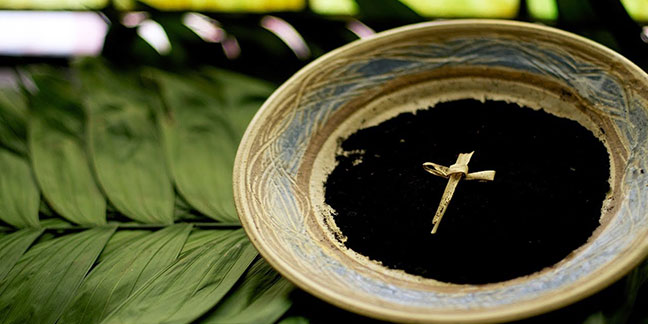Lent starts with Ash Wednesday, Feb. 14
 Ash Wednesday is one of the most popular and important holy days in the liturgical calendar. Ash Wednesday opens Lent, a season of penitential prayer and fasting.
Ash Wednesday is one of the most popular and important holy days in the liturgical calendar. Ash Wednesday opens Lent, a season of penitential prayer and fasting.
Ash Wednesday takes place 46 days before Easter Sunday and is chiefly observed by Catholics, although many other Christians observe it, too.
Ash Wednesday comes from the ancient Jewish tradition of penance and fasting. The practice includes the wearing of ashes on the head. The ashes symbolize the dust from which God made us. As the priest applies the ashes to a person’s forehead, he speaks the words: “Remember that you are dust, and to dust you shall return.”
Alternatively, the priest may speak the words, “Repent and believe in the Gospel.”
Ashes also symbolize grief, in this case, grief that we have sinned and caused division from God. Writings from the second-century Church refer to the wearing of ashes as a sign of penance.
The Ashes
The ashes are made from blessed palm branches, taken from the previous year’s Palm Sunday Mass. They are christened with holy water and scented by exposure to incense.
While the ashes symbolize penance and contrition, they are also a reminder that God is gracious and merciful to those who call on Him with repentant hearts. His Divine Mercy is of utmost importance during the season of Lent, and the Church calls on us to seek that mercy during the entire Lenten season with reflection, prayer and penance.
Receiving ashes
While not a holy day of obligation, Ash Wednesday is a day of penitential prayer and fasting.
Priests administer ashes during Mass on Ash Wednesday and everyone – even non-Catholics and non-Christians – is invited to accept the ashes as a visible symbol of penance.
It is generally inappropriate to dine out, shop or go about in public after receiving the ashes.
Feasting is highly inappropriate. Small children, the elderly and the sick are exempt from this observance.
It is not required that a person wear the ashes for the rest of the day, and they may be washed off after Mass. However, many people keep the ashes as a reminder until the evening.
Recently, movements have developed that involve pastors distributing ashes to passersby in public places. This isn’t considered taboo, but Catholics should know this practice is distinctly Protestant. Catholics should still receive ashes within the context of Mass.
In some cases, ashes may be delivered by a priest or a family member to those who are sick or shut-in.
Why we receive ashes
Following the example of the Ninevites, who did penance in sackcloth and ashes, our foreheads are marked with ashes to humble our hearts and remind us that life passes away.
The distribution of ashes comes from a ceremony of ages past. Christians who had committed grave faults performed public penance. On Ash Wednesday, the bishop blessed the hair shirts they were to wear during their 40 days of penance, and sprinkled over them ashes made from the previous year’s palms. Then, while the faithful recited the Seven Penitential Psalms, the penitents were turned out of the church because of their sins – just as Adam, the first man, was turned out of
Paradise because of his disobedience. The penitents did not enter the church again until Maundy Thursday after having won reconciliation by the toil of 40 days’ penance and sacramental absolution.
— Catholic Online
Inspiring words for your Lenten journey
St. Augustine: “Fasting cleanses the soul, raises the mind, subjects one’s flesh to the spirit, renders the heart contrite and humble, scatters the clouds of concupiscence, quenches the fire of lust, kindles the true light of chastity.”
Flannery O’Connor: “I do not know you, God, because I am in the way. Please help me to push myself aside.”
Dorothy Day: “How shall we have the means to help our brother who is in need? We can do without those unnecessary things which become habits, cigarettes, liquor, coffee, tea, candy, sodas, soft drinks and those foods at meals which only titillate the palate. We all have these habits, the youngest and the oldest. And we have to die to ourselves in order to live, we have to put off the old man and put on Christ. That it is so hard, that it arouses so much opposition, serves to show what an accumulation there is in all of us of unnecessary desires.”
Archbishop Fulton Sheen: “Never forget that there are only two philosophies to rule your life: the one of the cross, which starts with the fast and ends with the feast. The other of Satan, which starts with the feast and ends with the headache.”
St. John Chrysostom: “Fasting of the body is food for the soul.”
St. Catherine of Siena: “Nothing great is ever achieved without much enduring.”

